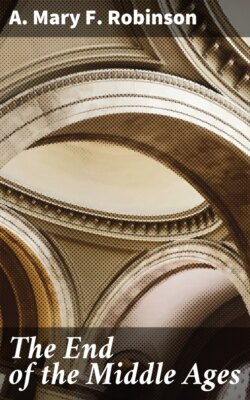Читать книгу The End of the Middle Ages - A. Mary F. Robinson - Страница 31
На сайте Литреса книга снята с продажи.
VII.
ОглавлениеTable of Contents
It is not, then, a personal delight that awaits the Mystic in the abyss; it is the sense of absorption in his Deity. It is hard to define the character of this Godhead for which the man so gladly lays down his soul and his life. Since it is identical with the foundation of the soul (and this, Eckhart assures us, is not only Divine and simple, but an Utter Nothingness), it is difficult to lay hold of the idea of its divinity—or indeed of its difference from created matter which is also purum Nihil, and it is easy to see how, by this path of negation, Mysticism always diverges into Pantheism. … The essence of the Mystical Divinity appears to be its very incomprehensibility; and it would be rash and vain indeed to form an idea thereof. But we may at least attempt to understand what that divinity appeared to its worshippers.
“The One,” begins Plotinus, “is neither substance, nor quality, nor reason, nor soul, neither moving, nor at rest, not in place and not in time; neither is it of any sort or kind.” Thus we learn what things were not intrinsic to the Deity; we learn that we must conceive a bodiless, unqualified, impersonal, interminable Void; an eternal, undifferentiate essence of existence; an infinite Being not to be approached by reason or by soul. Eckhart goes a step further, and affirms not only what the Godhead is not, but even what it is. “There is a Godhead,” he says, “above God. The Godhead neither moves nor works. … It is a simple Stillness, an eternal Silence.”
If this were all we might comprehend the longing for quiet, the passionate desire for rest which made the wearied and the trouble-harried of all times deify silence and repose. Mysticism has ever flourished best in starved or stormy ages. It is the shrinking of the soul from a perplexed and hideous outer life; it is in some the desire for love and peace, in some the desire for rest, in some for immortality elsewhere. But in logical and speculative minds it is more than this; the God of the Speculative Mystics is not merely Sleep, not merely Dreams, not merely Stillness. They carry their reasoning fearlessly to its natural conclusion, and this is worthy of all praise in them; but that they should worship that conclusion is surely strange—for “God is non-being,” writes Scotus Erigena; and, Eckhart adds that when the soul penetrates the pure uncreate essence of the Godhead, then Nothingness is at last in the presence of Nothingness.
